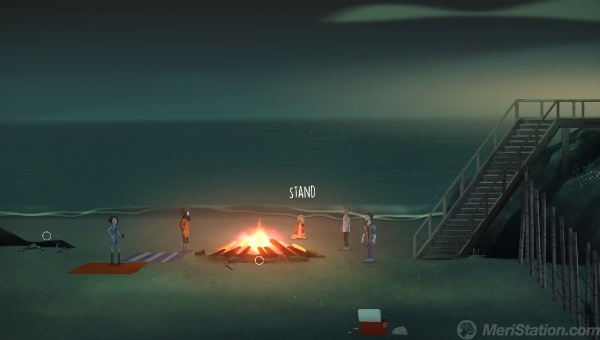Playing is fun. And read or listen to a good story, too. So why not put both together? It is such an obvious idea that it occurred to many developers before most of us had a pair of legs around which to fasten diapers. In the same decade in which arcades such as
Pong and Space Invaders began to shape this industry, the first textual adventures experimented with the possibilities offered by the interaction through texts instead of balls or ships. Forty years later, Oxenfree reminds us that there are still steps to be taken
in that direction. It may sound like a grandiloquent introduction to the debut feature of Night School Studio, which probably does not win lots of prizes,
nor cause a huge impact on the industry. It is not even one of the most popular indies this year despite sharing certain similarities with some of them (like Firewatch). But that does not mean that it is one of the most interesting, especially for those who enjoy participating in a story through a remote control or a keyboard.
At this point we know very well that words are not strictly necessary, ideas can be communicated through visual language. But sometimes you can not go
around: if you want to tell the adventures of a gang of friends who meet to spend the night on a desert island, joking and drinking beers around a bonfire, it
does not make much sense to make them look at each other to the others in complete silence. Adolescence is a stage of change, hormonal effervescence and
melodrama that has served as the basis for numerous series and films, as well as games that have also represented more or less correctly their relationships.
Even though we have left that period behind and it is no longer so easy to be reflected, there is a certain charm in the immaturity of characters who still do
not know who they are going to be in the grand scheme of life. It is a contrast between impetus and fragility that, although sometimes undermined by the
use of cliches (popular girl with attitude problems, adorable but socially awkward geek boy), is fascinating because it generates a situation of constant instability. Especially if you also add a few paranormal phenomena to the mix.
A new way of understanding conversations
Although the interaction through branches of dialogues is something that has been with us since the beginning of videogames, for reasons of convenience we are going to jump directly to 2012. In that year, Telltale Games caused a small revolution within the graphic adventures by passing completely the focus of the puzzles to the plot exposition and the decision making in
The Walking Dead. Although it was far from being a new proposal (Telltale itself had already been preparing the ground in previous games, and
Quantic Dream lived from this for years), The Walking Dead achieved greater success than their ancestors and spurred the emergence of multiple
imitators inside like outside the Californian study. It has practically become a subgenre of its own, the adventures “Telltale style”, that can go from a
The Wolf Among Us to a Life is Strange, and that despite having different ideas and themes, always use dialogue as a catalyst that advances and redirects
the plot within the limits imposed by the developer. A simple and effective solution to create a narrative experience in which the player feels involved.
However, there is a problem. Maybe it’s not the biggest (fans of the old-time graphic adventures will miss the elaborate puzzles), or maybe it’s not even really a problem if the games manage to immerse us in the narrative and hesitate to make decisions. However, the truth is that even after these four decades of evolution there is still a barrier that we have not finished
transgressing, although it is one in which Oxenfree finally begins to take its toll: converting dialogues into a means of natural interaction with others characters and not a simple mechanics meant to make us jump between different versions of the story. I suppose it goes
without saying that it is really just an illusion. There is always a trick behind the best of magic. But the Oxenfree is ingenious, and it works surprisingly
well because it flows conversations aside from our participation. Except for a series of exceptions, we can almost play the game from beginning to end without our protagonist, the young Alex, articulate word (there is even an achievement that encourages you to try it).

